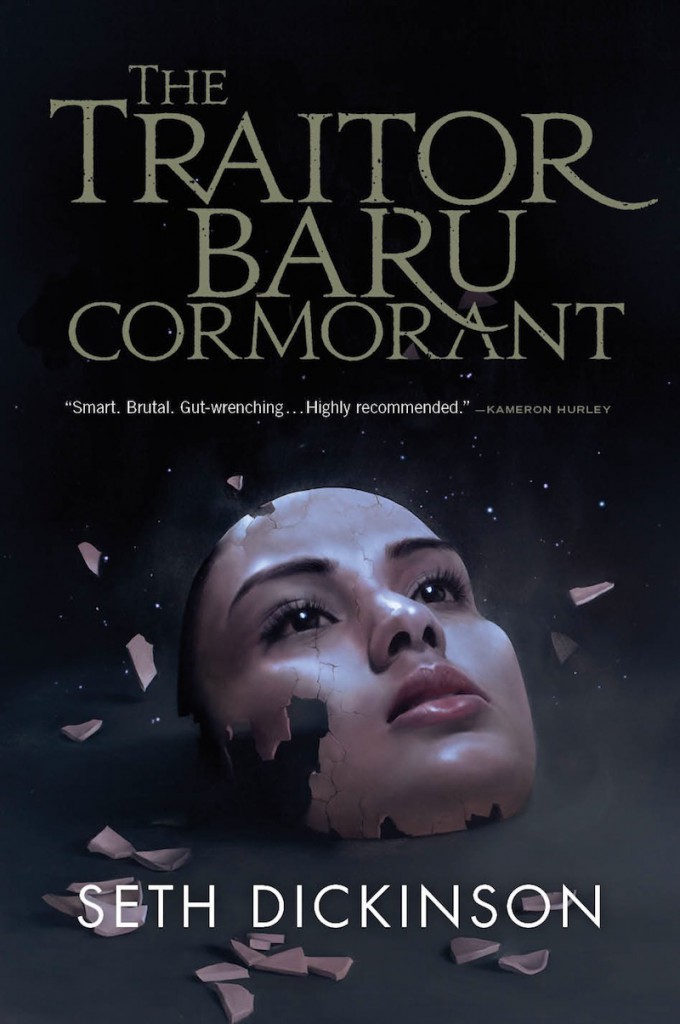Baru's guard found a fulling mill by a nearby stream. They brought her there to wait.OK, so she's not an ordinary accountant. She was born in Taranoke, an island country with liberal sexual mores. When she was seven, it was conquered by the Empire of Masks, governed out of Falcrest (by committee, it turns out; the Emperor is a faceless — masked — figurehead). She goes to their schools, is indoctrinated into their Incrastic philosophy. It appears that she has a protector; she is essentially groomed for public service. She performs well on their exams and fresh out of school is awarded a post as Imperial Accountant of Aurdwynn. This conquered nation has a history of rebellion; Baru Cormorant determines that her task is to quell the insurgents, but instead she fuels a revolution.
The terror that took Baru came from the deepest part of her soul. It was terror particular to her, a fundamental concern — the apocalyptic possibility that the world simply did not permit plans, that it worked in chaotic and unmasterable ways, that one single stroke of fortune, one well-aimed bowshot by a man she had never met, could bring total disaster. The fear that the basic logic she used to negotiate the world was a lie.
Or, worse, that she herself could not plan: that she was as blind as a child, too limited and self-deceptive to integrate the necessary information, and that when the reckoning between her model and the pure asymbolic fact of the world came, the world would devour her like a cuttlefish snapping up bait.
The millwheel had been uncoupled from the machinery and it turned in useless creaking circles.
I've described this book to some people in terms of Game of Thrones: a similar level of politics, machination, and battle planning, but minus the melodrama. A system of government that is if not exactly more modern, a little less barbaric — more complex. This book is more intimate, but somehow no less epic.
The Empire offers education and scientific advancements, medicine and sanitation. But. Incrasticism, possibly from Latin crāstinus "of or belonging to tomorrow", from crās "tomorrow", possibly related to Latin crassus "solid, thick". Never explicitly defined, but we have a clear sense of the dystopian evil of Incrastics.
It occurred to me early on in my reading that this could have been a work based on history. And that would've bored me to tears. Pages of balancing the books, examining the intricacies of trade agreements. Instead, it's genre fiction, so I'm all over it. But this world is ever so subtly removed from an actual one. The character's name are exotic. They practice — and enforce — social and moral hygiene, and some kind of eugenics ("hereditary regulation"). Midway through the novel we encounter the Clarified, conditioned from birth by drugs and other methods to serve.
Quite apart from that, this novel gave me the feeling that it's telling of a time in our actual history. These fantastical elements are expertly woven into the background world; the story is not about these things, but it is a story because of these things.
It was serendipitous to have read Claire North's Gameshouse novellas before embarking on the Traitor's story; it served well as a warmup game of chess, people as pawns.
There's a lot to chew on in this book: hegemony and colonialization, the logistics of rebellion, civic duty at what personal cost. I want to follow the rest of Baru Cormorant's career. I want to explore the rest of the Empire. I want to better understand the hygiene, the regulation, the Clarified, the Incrasticism.
Elsewhere
Seth Dickinson: The Secret Design of the Traitor Baru Cormorant
"In order to make Baru a useful citizen, the Masquerade hopes to create a state of learned helplessness: no matter what you do, it ends up serving our purposes. Accept your place."
Niall Alexander: Tor.com
"To tell the truth, Baru is terrifying at times; a barely-suppressed scream of a human being — yet we want what she wants."
Kameron Hurley: What Will You Sacrifice? The Traitor Baru Cormorant, Kameron Hurley
"It's set up from the beginning as a tragedy about power and commerce and sacrifice, and that's exactly what you get."
Arkady Martine: A Response (spoilers)
"From the beginning this is a book about complicity; it is a book about committing great and profound injustices for the sake of some future possibility of justice."
Excerpt





